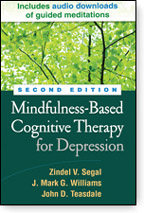 Few psychological interventions have engendered so much promise and delivered on that promise with such impressive clinical outcomes and research findings as Mindfulness-Based Cognitive Therapy (MBCT). The skillful “marriage” of cognitive behavioral therapy and mindfulness practice, MBCT has emerged as an effective treatment to prevent relapse in depression and is yielding good initial results in other settings and with other populations as well. With the imminent publication of the Second Edition of Mindfulness-Based Cognitive Therapy (Guilford Publications), MBCT has entered it’s next generation, incorporating the ongoing work of co-founders Zindel Segal, Mark Williams and John Teasdale, with the input and efforts of numerous clinicians and researchers worldwide.
Few psychological interventions have engendered so much promise and delivered on that promise with such impressive clinical outcomes and research findings as Mindfulness-Based Cognitive Therapy (MBCT). The skillful “marriage” of cognitive behavioral therapy and mindfulness practice, MBCT has emerged as an effective treatment to prevent relapse in depression and is yielding good initial results in other settings and with other populations as well. With the imminent publication of the Second Edition of Mindfulness-Based Cognitive Therapy (Guilford Publications), MBCT has entered it’s next generation, incorporating the ongoing work of co-founders Zindel Segal, Mark Williams and John Teasdale, with the input and efforts of numerous clinicians and researchers worldwide.
 “Ten years have passed since the publication of Mindfulness Based Cognitive Therapy,” noted Zindel Segal recently, “and in that time there has been a productive engagement and interchange with clinicians and researchers who have offered and studied the program with their own patients. Mark, John and I have been fortunate to be involved in some of these discussions and have learned from many ‘early adopters’ as well as from the increasing volume of empirical work that has evaluated and stretched MBCT to novel populations. The second edition of MBCT gives us an opportunity to embed this ‘crowd sourced’ wisdom and feedback into an updated and expanded version of the book that offers a few refinements to the 8-week program and grapples, more generally, with the question of how the delivery of mindfulness based interventions can be optimized.”
“Ten years have passed since the publication of Mindfulness Based Cognitive Therapy,” noted Zindel Segal recently, “and in that time there has been a productive engagement and interchange with clinicians and researchers who have offered and studied the program with their own patients. Mark, John and I have been fortunate to be involved in some of these discussions and have learned from many ‘early adopters’ as well as from the increasing volume of empirical work that has evaluated and stretched MBCT to novel populations. The second edition of MBCT gives us an opportunity to embed this ‘crowd sourced’ wisdom and feedback into an updated and expanded version of the book that offers a few refinements to the 8-week program and grapples, more generally, with the question of how the delivery of mindfulness based interventions can be optimized.”
“Kindness and compassion are the ground from which we practice, the ground from which we teach, and the ground that participants may then use in cultivating their own practice.”
(From the Second Edition)
Perhaps most notable in the new edition is a chapter solely dedicated to the topic of compassion in MBCT. Segal reports that “an oft-repeated question I hear is ‘what is the role of compassion training in MBCT?’ This reflects perhaps the pervasive interest in bringing compassion to patients who are suffering, as well as an enthusiasm for newer protocols that feature compassion training as a central intervention. The answer with respect to MBCT is not as straightforward as checking whether formal compassion or loving kindness is or is not taught within the 8 weeks. It revolves around the deeper question of what exactly compassion means in a clinical context and how it can help address the vulnerability or illness perpetuating factors that keep people locked into symptoms and distress.”
FREE CHAPTER PREVIEW!
In advance of the release of the Second Edition of MBCT, Chapter 8, entitled “Pausing for Reflection: Kindness and Self-Compassion in MBCT” is available for free by emailing the UC San Diego Center for Mindfulness at mindfulness@ucsd.edu and requesting a copy.
Book purchasers get access to a companion Web page featuring downloadable audio recordings of the guided mindfulness practices (meditations and mindful movement), plus all of the reproducibles, ready to download and print in a convenient 8 1/2" x 11" size. A separate web page for use by clients features the audio recordings only.
As innovative as the MBCT program itself, the 5-day MBCT teacher training offered through the UC San Diego Center for Mindfulness is a “wonderful opportunity to experience the intricate interweaving of mindfulness practice and cognitive therapy skills in the delivery of the 8 week program," said Segal. “Our days are long and incorporate elements of personal practice and clinical training all held within a retreat framework that clarifies intention, observation and self-compassion in the learning process. If you are interested in learning the MBCT program ‘from the inside’ this is the best vehicle for doing so.”
For those who already have experience teaching MBCT or Mindfulness-Based Stress Reduction (MBSR) UCSD is now offering an Advanced Training for MBCT and MBSR Teachers taught by experienced teachers and trainers Susan Woods and Char Wilkins. Intended to focus upon universal principles for teaching mindfulness-based interventions. As such, the focus for this training is less about teaching to the structure of MBCT and/or MBSR and more about intentionally embodying mindful presence and strengthening the facilitation of mindful inquiry.
What Are Your Thoughts? We would love to hear your thoughts on the approach of explicitly teaching compassion and lovingkindness practice within mindfulness-based interventions like MBCT, versus the more implicit approach described by Segal et al in the new 2nd edition of the MBCT book (free pdf copy of the chapter available upon request at mindfulness@ucsd.edu ). Please share your thoughts and opinions below.

